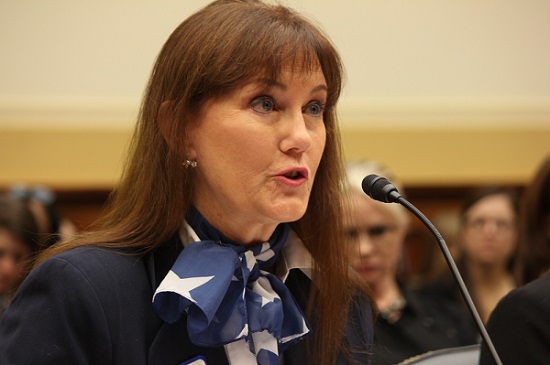
By Wendy Verlaine/August 15, 2019
Photos Courtesy AAI
Nancy Rivard may be one of the most influential and dedicated activists for human rights and charitable giving in the airline and hospitality industry. She is shining the spotlight on human trafficking, the fastest growing criminal industry in the world today, producing over $150 billion annually, according to the Department of State.
“I said, ‘How am I to create change in the largest industry in the world?’ My inner voice just said stop talking about it, start doing it. I will do one thing a month that directly helps a child.” Nancy Rivard
Today Rivard is founder of Airline Ambassadors International, AAI, a non profit organization committed to fighting human trafficking and educating the airline and hospitality industry to the signs and prevention of this activity.
AAI volunteers have hand-delivered $70 million in aid to needy children and families all around the world.
AAI has also helped establish medical clinics and volunteer medical escort aid that transports patients in need to the US for treatment.
I was fortunate to catch up with this dedicated changemaker and ask her how she discovered her life’s purpose, how uncertainty did not deter her and how she successfully influenced and affected so many people on a global level…
EYE: Was there a defining moment when you decided to change the direction of your career as an airline attendant supervisor positioned to climb the corporate ladder?
NANCY: Yes, it was 1981 and I was twenty nine and on an upward corporate path rising at American Airlines when I embarked on a seven year spiritual search. I went back to being a flight attendant, and I traveled all around the world and attended many international conferences with my time off as a flight attendant.
EYE: What did you do at the conferences?
NANCY: I talked to everyone from prime ministers to airline executives to media moguls about my beginning idea of a humanitarian program. I met with literally hundreds of people. At the end of seven years I moved to Hawaii to get quiet and question what to do next.
EYE: What was your first vision for Airline Ambassadors International?
NANCY: In 1992 I attended the United Nations Earth Summit in Rio de Janeiro where I got to emcee one of the largest non-profit organizations (NGO) not affiliated with any government. Everyone from Al Gore, presidents, and business leaders to Indian chiefs were on the panel. All gathered working for a better world.
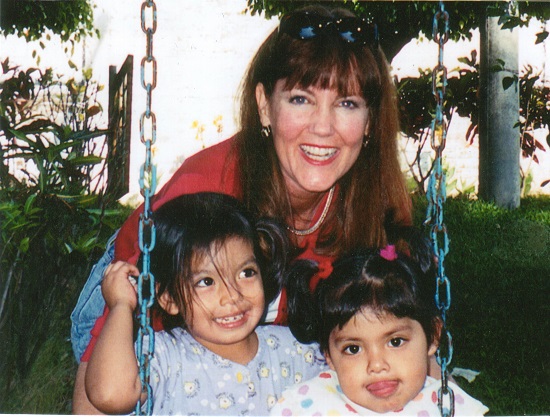
EYE: After meeting and talking to many important people about your idea, can you reflect on one individual who most influenced you?
RIVARD: Mikhail Gorbachev, whom I met and just adored, invited me to help with a conference he was organizing in Kyoto, Japan called The Green Cross, an international environmental leadership and human rights organization.
EYE: What happened at the Kyoto conference?
NANCY: I went by myself to the amazing conference where I was the only airline ambassador. I learned so much about starting a NGO organization from many of the best and the brightest minds in the world.
EYE: What do you value most from attending conferences?
NANCY: I had remarkable experiences connecting with wonderful people, and knew I had to move to New York City. I represented Campaign for the Earth, which predated AAI. This organization became a NGO. I volunteered every day that I was not flying at the United Nations.
EYE: Tell us about your first tangible idea in your quest to make a difference.
NANCY: Well, I had this idea, Airline Ambassadors, Traveling to Make a Difference. We (airline attendants) would use our pass privileges to help children.
On our layovers we collected our hotel amenities from our hotels, like soap, shampoos, pens etc. We brought them to refugee kids and women in need all around the world. They were received like gold.
EYE: How did you expand your idea?
NANCY: Well, nobody was interested. I called all the airlines to ask them to get involved, and talked to all the flight attendants. Even other flight attendants weren’t the least bit interested.
The following month I got two flight attendants to go with me to Bosnia. Next I used my airline passes to escort a little Bosnia child down to Equador where she received donated heart surgery by a US medical care group.
That was in 1993. We started doing escort and aid missions before we officially started our humanitarian non-profit organization in 1996, Traveling to Make a Difference.
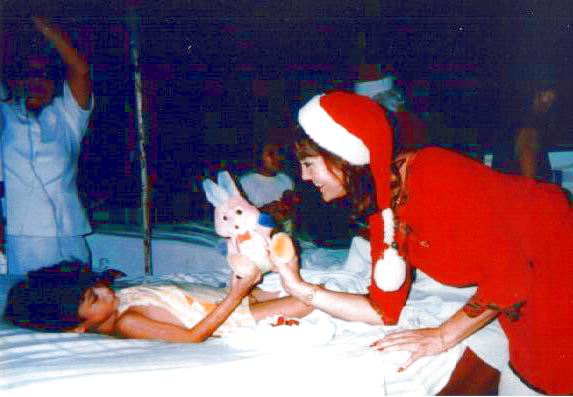
EYE: How did that first mission jump start your cause, help you spread your idea and generate excitement?
NANCY: Well, the flight attendants started asking ‘What are you doing?” We started getting lots of people interested and on our mailing list. Every month we were making a mission getting many volunteers from everywhere to hand deliver aid to children. We also started the escort medical program.
We now have made a long-term commitment in many countries where we have made a huge impact on children. Our escort program has moved seventy million dollars worth of aid all over the world.
We’ve expanded to include many more than just flight attendants and air crew, but to anyone who wants to travel and help others.
EYE: How did AAI begin to fight human trafficking?
NANCY: In 2009 we attended a humanitarian conference where we met Deborah Sigmund, founder of Innocents at Risk.
I said we should get involved! I invited Sigmund to join us in the Dominican Republic where twelve of us from various airlines promised each other we would be aware of this problem. Amazingly, on our flights back, on four different airlines, we correctly identified trafficking.
The first tip led to the busting of a Boston pornography ring and saved eighty-six children. That’s how we know we were on to something.
EYE: Was that how you first realized how effective you could be by getting the travel industry involved?
NANCY: That was how we knew we had to educate the travel industry. I asked Congressman Christopher Smith from New Jersey for help. He is the author of the Trafficking Victims Protection Act, the first legislation on human trafficking in the US.
In 2010 we did two briefings to the industry and nothing happened. So we developed the first industry specific training on how to spot traffickers and what to do. We provide volunteer trainings too. We do the presentations and give them along with the survivors who are a key part of the presentations.
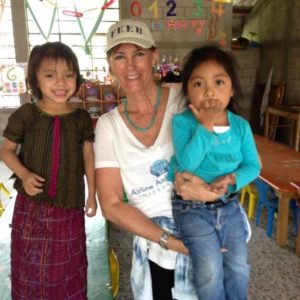
EYE: How many trainings have you completed?
NANCY: We have done one hundred and five airline trainings to date, training 7,000 airline personnel.
We developed a training and vetted it with Homeland Security and Customs Border Protection, the Department of Transportation and Department of State.
We ran our training by everyone. When flight attendants spot something they tell the pilot to radio ahead and call law enforcement.
We realized that training airline personnel on human trafficking would be crucial in identifying traffickers and trafficking victims.
EYE: Is it difficult to get the attention and interest of airlines and airline personnel, and is this an ongoing difficulty? What is your greatest frustration?
NANCY: Well Delta trained 80,000 employees. They’re number one, but that is really just sending out the link to the online training. That’s not good enough. The airline attendants want to see a lot more done. Air Asia and Air Emirates were the best airlines so far.
NANCY: We signed a MOU (Memorandum of Understanding, a formal document describing the outlines of the agreement) with Airline Association of Airport Executives. We might get Airport Council International to sign too.
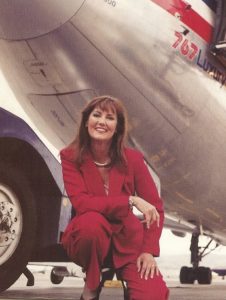
EYE: Can you site an example of reluctance on the part of airline personnel in taking this seriously?
NANCY: We had a case on a flight from Rome to Chicago where all eight flight attendants thought a man was trafficking a seven year old girl. They told the pilots and the pilots refused to call it in because we could, ‘get the guy in a lot of trouble.’
We said it is in your manual! They said it was never mentioned in the training. I don’t know what happened to that child.
EYE: Is there a way you can publicly praise participating airlines or shame those who won’t do anything?
NANCY: We try to use the good guy approach, but the truth is the only thing that moves the airline industry is money. And it would cost almost nothing because the airlines already have the infrastructure.
When I told American they were not going to be able to get a federal contract in the upcoming year of 2015, they put a human trafficking policy in place within two weeks. That is what speaks to them more than a corporate commitment.
EYE: How do you fund your efforts?
NANCY: We need to find funding to put this training in place, to have it taken seriously. We only get the flight attendants’ AAI membership fee of $35/month.
Even though we have signed MOUs and are affiliated with the United Nations and recognized by the US Congress, we have not gotten any federal money.
EYE: Tell me about your wonderful volunteers
NANCY: We are one of the first to have started humanitarian travel, and have spearheaded volunteering to help others. We visited orphanages in the Philippians, South Africa, Haiti, El Salvador, Guatemala, among others.
We just recently returned from Nepal. We are a UN accredited NGO, and the only relief and development organization representing the entire airline industry.
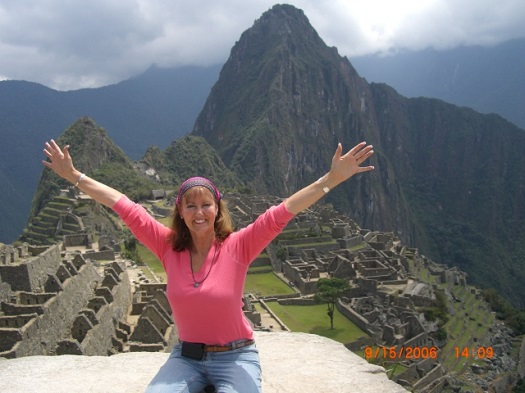
EYE: Despite the lack of federal money, AAI should be very proud of their ongoing work. Nancy Rivard has seen AAI turn into an organization that includes thousands of medical professionals, families, students, retirees and airline workers, all of whom volunteer as Airline Ambassadors of goodwill.
The aid provided by AAI programs bring valued help to orphans and vulnerable children on a global scale. They spend over half a million dollars of their own money, and work tirelessly to develop contracts with a slow-to-respond airline industry.
Nancy Rivard has shown all of us that an abstract idea can bloom into a soul-satisfying and valuable effort that benefits many. She exemplifies a way for all of us to reach our personal goals.
Thank you Nancy for giving us some of your valuable time. I wish you continued success and happiness in all your endeavors.
Rivard retired from her flight-attendant career in August 2013 and now dedicates all of her time to the volunteer group she founded. She is currently writing a book, Wings of Love, about her journey to her life’s work. It will be release sometime next year.
twitter: @AirlineAmbIntl
facebook: airlineamb
instagram: airlineambassadors
###



It’s amazing how much impact one private citizen can make in today’s world. Nancy Rivard is a humanitarian hero. Human trafficking has been in the spot light for at least the last eight years. It’s very disheartening to learn how uncooperative the airlines were in recognizing they could be a party to human traffickers using their services. Bravo to Women’s Eye for sharing Rivard’s story.
Thanks, Pat, for sharing your thoughts! We appreciate your interest in TWE!
Thanks, Pat, for your support and response! Glad you are coming to our site!